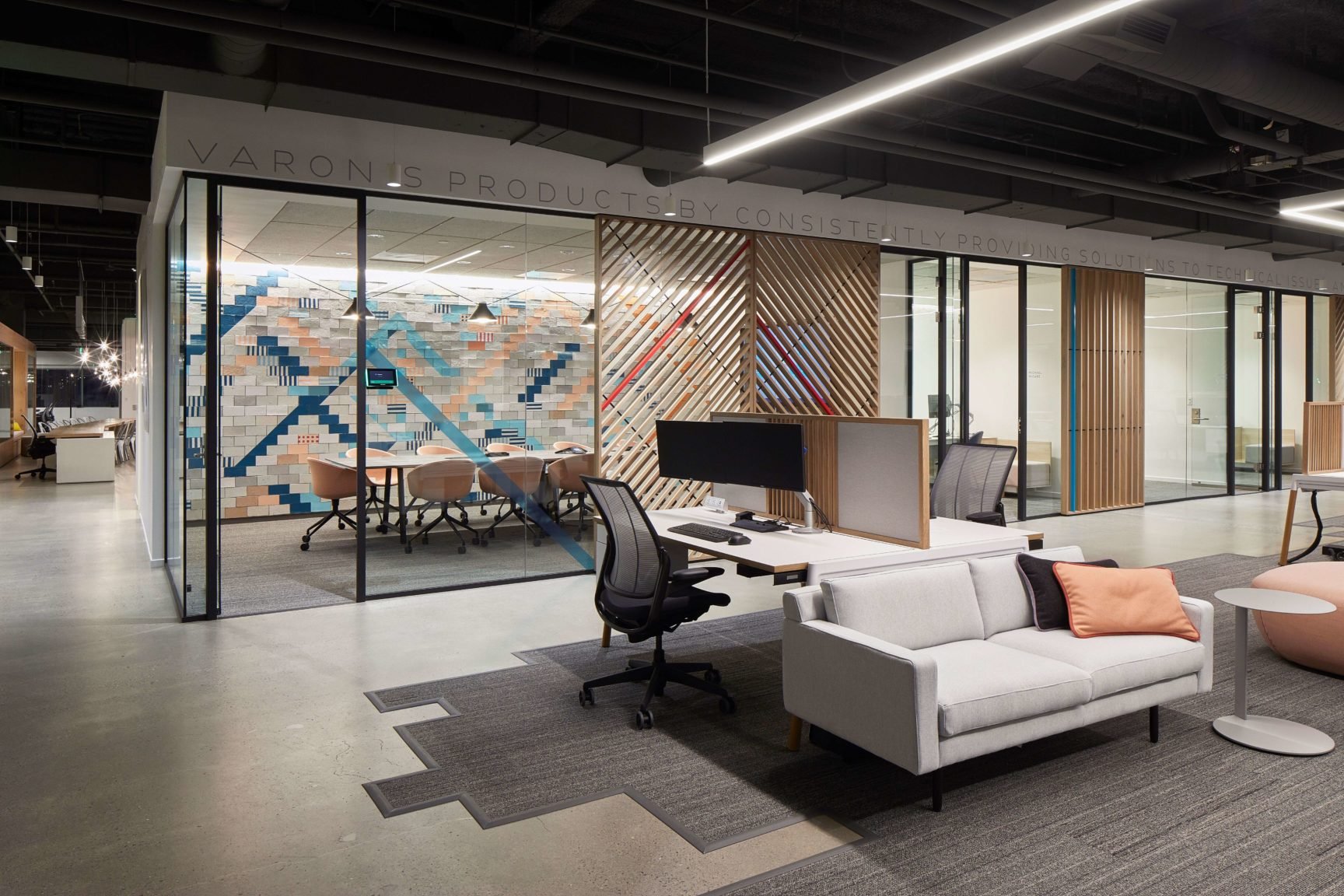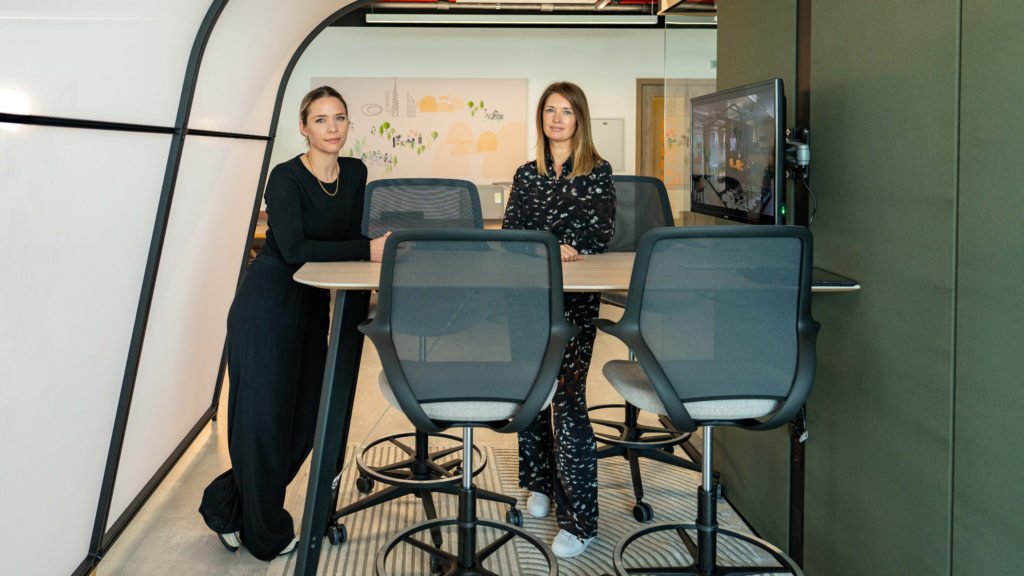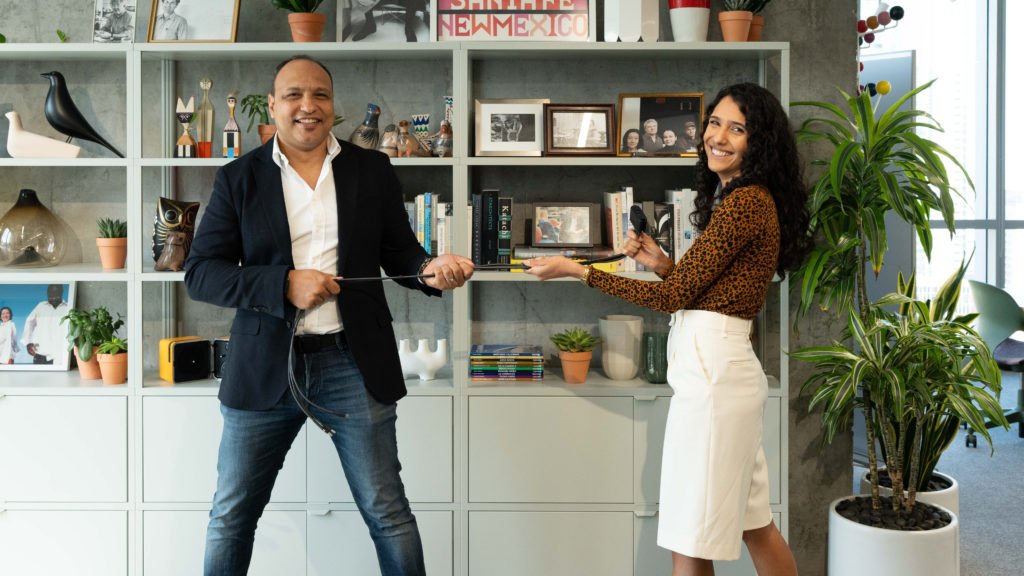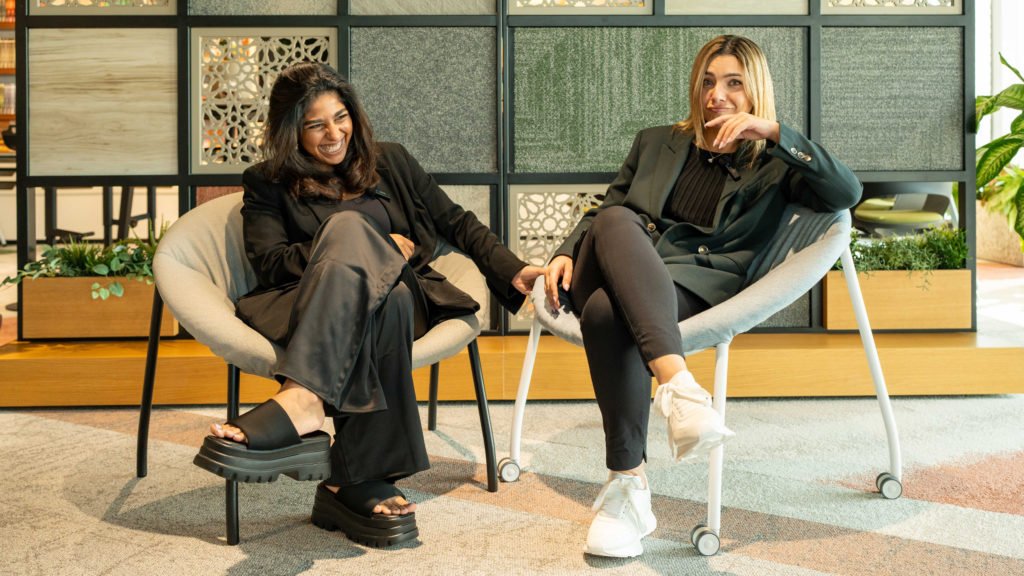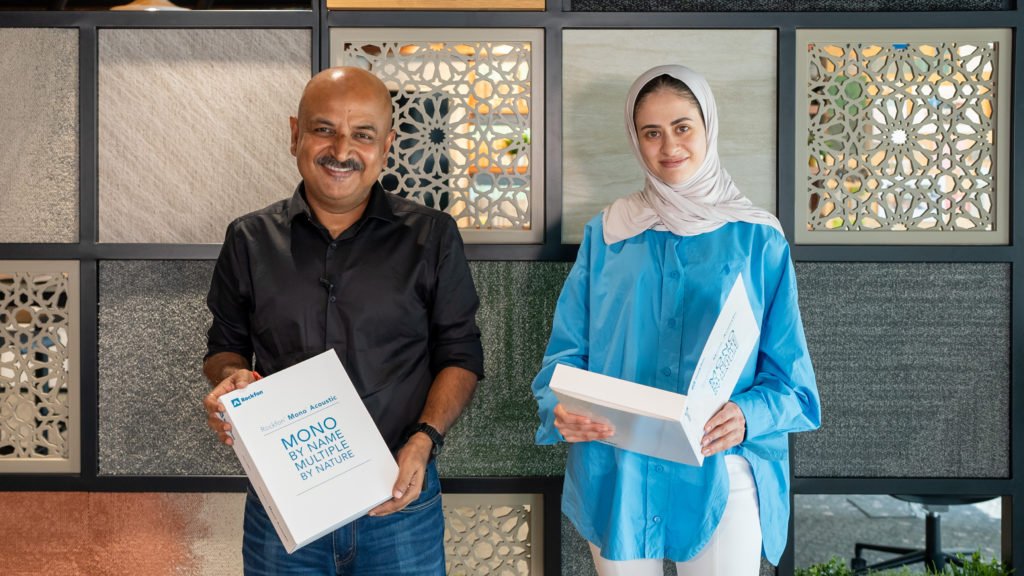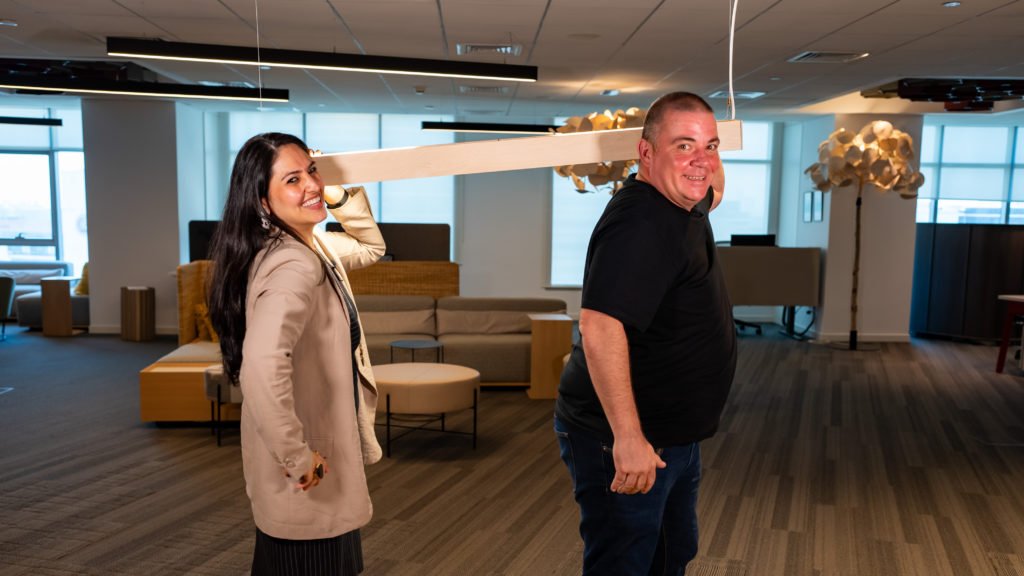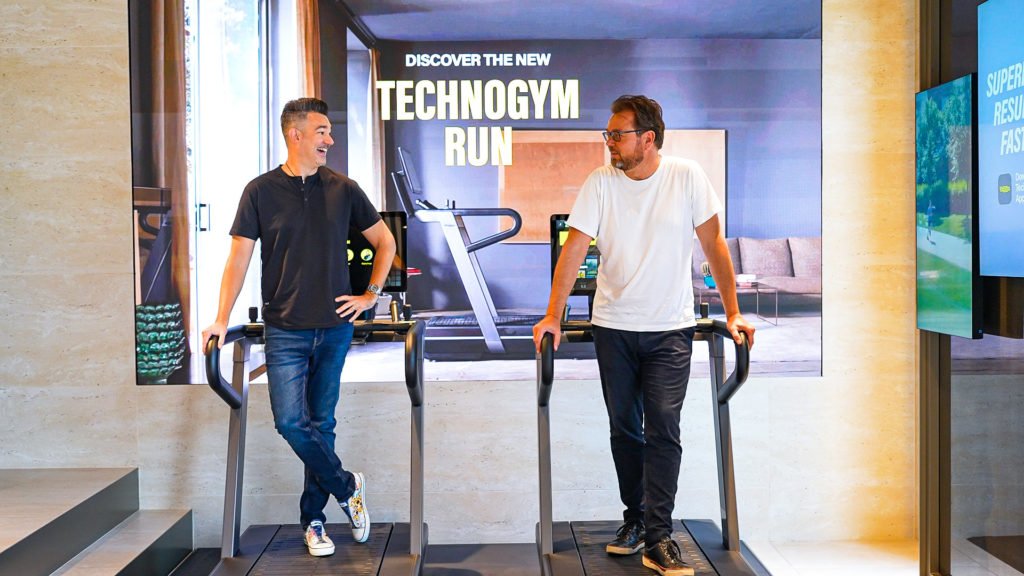For our latest product review, we flew to Kuwait City, to the Al Jabriya Furniture showroom, Humanscale’s local dealership, to test out their Smart Ocean chair. Frazer Butcher, Managing Director of Humanscale MENA, led the presentation, and joining us for this review were designers Ben Backhouse from Pace and Lydia Ibrahim from SSH. Here is what we learned…
If chairs could talk, Humanscale’s Smart Ocean chair would have quite a story to tell. Not only is it an innovative adaptation of the Diffrient Smart chair, designed by Niels Diffrient himself, but also the first ergonomic chair made from recycled nets. With chairs like the Freedom and Liberty models in their portfolio, the ergonomic specialists at Humanscale had already set the bar quite high for themselves and their competition. So when they launched the Smart Ocean Chair, we of course, simply had to test it out.
The Review Crew
Above from left: Ben Backhouse, Director of Interior Design at Pace Interiors, Lydia Ibrahim, Interior Designer at SSH, and Frazer Butcher, Managing Director, Middle East & North Africa at Humanscale.
Sustainable Manufacturing
The design and development of this chair is a great story in itself, but also part of a larger plan for the brand. “Our goal is to be transparent to our clients and all our stakeholders,” says Frazer. This is achieved by using two formats, The Health Product Declaration® (HPD) and the Declare label. While the HPD Collaborative is a non-profit entity that ensures transparency and ingredient disclosure as fundamental to doing business in the materials ecosystem, the Declare label sits as part of the greater Living Product Challenge. “The Declare label is like a nutritional info label, but for manufactured goods,” says Frazer. “We’re using it to provide clarity and disclose the materials we use in our products to our customers.”
Being transparent, however, comes at a cost, because it involves adopting sustainable processes that can be expensive and time consuming. But Humanscale are way ahead of the competition. They have already stopped using materials, such as PVC and Chrome 6, both of which are known to be carcinogenic. Instead, their products come in a polished aluminium finish, which is far more sustainable and eco-friendly. “We want to bring about awareness in the market, and educate our clients on achieving both sustainability and wellness goals through the use of right products,” says Frazer.
From the Ocean to the Office
The Smart Ocean chair’s uniqueness comes from the very material used to create it, i.e. two pounds of recycled fishing net.
The material is specifically referred to as NetPlus, sourced from Net Positiva, a collection and recycling programme aimed at combating the detrimental impact of ocean fishing nets. It’s done in partnership with Bureo, a start-up that has taken on the mission of removing plastic from the ocean, by collecting discarded fishing nets from water bodies in and around Chile, for use as source material for the Net Positiva program. The nylon in the nets undergoes a process that outputs pellets, which is the NetPlus material incorporated in the Smart Ocean chair. Ocean nets are made from Nylon 6, which doesn’t break down and harms aquatic life. By taking these out of the oceans, the Net Positiva program isn’t just cleaning the ocean one net at a time, but starting a sustainable supply chain as well. As a bonus, no harmful VOCs or glues are used during assembly, so when disassembled, the parts can easily be taken apart.
“I love the story behind the chair. I’m personally driven by the aesthetic quality of a product when specifying, so for a chair to have both great design and positive environmental impact makes it an easy product to sell to a client,” says Lydia.
The Smart Ocean chair operates at an exceptionally high quality of function, aesthetic, and sustainability. As an adaptation of the Diffrient Smart chair, its credibility as a task chair is already established. As a sustainable product, you don’t need to look beyond its Living Product certification (it meets the most rigorous sustainable manufacturing criteria to date). And those familiar with BIFMA will be thrilled to know that Humanscale has reached the Level 3 certification, the only manufacturer to do so.
Ben: It’s a beautiful and simple chair that underplays its own merits. There’s so much of research and development that has gone into it. Who would think the material you’re sitting on used to be a fishing net lying on the coast of Chile? Humanscale is a modern leader that is trying hard to enforce positive change in their companies and industries. As designers, we can help them achieve their sustainability goals by guiding and educating clients on products like the Smart Ocean chair. Projects are more demanding now and we’re seeing higher grade specs come up more often. It’s also becoming harder to determine the true environmental impact of a product, so programs like Declare labels really go a long way.
Lydia: I know they say form follows function, but the latter is a bigger influence on my decisions. I’m still very conscious of the ergonomic quality and support available, but I always look for products that fit the aesthetic theme of the project. That being said, the Smart Ocean chair makes my job easy. I like the edgy look and clean lines.
I’ve come across several products with a sustainability angle to them, but few are as thorough as this chair. It’s got a great story and I’m going to enjoy telling it to my clients. It makes it easier for us to convince the ones who are usually skeptical.
Features
The chair stays true to Niel Diffrient’s design ethos. Like the Liberty and Freedom chair, it needs minimal adjustment, and flexes to fit the user. “Niel’s designs were always to the point,” says Frazer. “There was nothing on the product that didn’t need to be there. That was his philosophy and approach to design.”
The custom fit that users feel is offered by the form-sensing mesh technology that instantly adjusts to each unique user’s movements and posture. The mesh eliminates any need for adjustment, training, or instructions on how to use the chair. The armrests on the chair are connected to the back, a smart piece of design that allows the arms to support the user along the full range of motion as they recline or move forward while working. And the entire system is weight-sensing and self-locking, allowing 20 degrees of movement, using body weight to adjust the tension and recline of the chair.
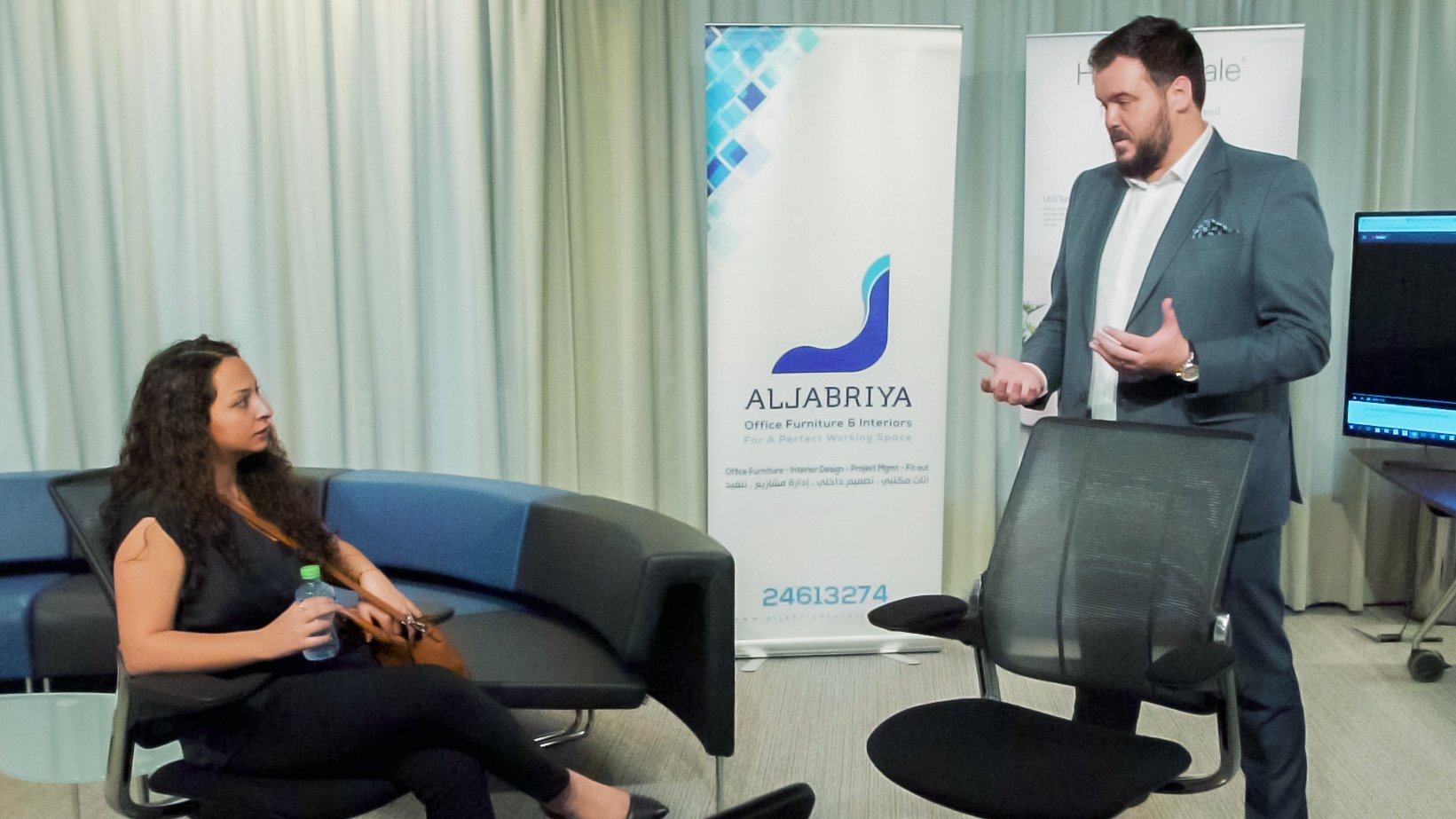
“Most task chair users complain about their chairs not being comfortable or feeling right,” says Ben. “The reality is that they’re simply not sitting right, or using the chair in the proper manner. To see a chair that requires minimal adjustment is a relief, and takes that frustration away.”
The technology in mesh refers to the Tri-Panel, a proprietary non-stretch mesh that provides customised lumbar support and fits like a tailored shirt. This innovative material was insisted upon by Niels Diffrient, who argued that because mesh stretches in two dimensions, it would need an external lumbar that users would have to constantly, and often incorrectly, adjust all the time. So they developed the tri-panel mesh to function as lumbar support, aligning with the Humanscale aesthetic and putting in place a minimal adjustment system.
Ben: It’s a great looking and comfortable chair. You wouldn’t think a back design like that would feel so good, but it does. It sorts of hugs you and adjusts to you, no matter what your height and weight. It’s undoubtedly easy to use as well. The shape seems to be based on the trend of incorporating sleek, clean and geometric lines. It’s also visually simple.
What I would recommend is for the different smaller elements to be available in a few colour options to mix it up, because the chair itself is mostly black. Maybe the stitching and castor colours could be changed for better personalisation? It would add more personality to the design as more and more designers are wanting to express themselves and the client through colour. The automatic adjustment feature is ideal for today’s busy people. It also works in today’s workspaces, where assigned seating is becoming a thing of the past.
Lydia: People here in the Middle East are known to work long hours. Imagine sitting for eight hours on a task chair. Over time your posture will slip, and you’ll start slouching and sit awkwardly. So it’s great to have a chair that will support you no matter what. With the Smart Ocean chair, it’s very easy to do so. The system is designed to involve minimal thinking on the user’s part, which is usually not the case, as task chairs tend to come with so many confusing levers and knobs.
I do feel the need for a few more customisation options. Like the seat pad – I can work with the back mesh colours, but I would like the seat fabric to be available in different colours as well. The stitching detail is beautiful and I would love to add some colour to that as well!
Final Thoughts
The Smart Ocean chair ticks a lot of boxes on the wellness and sustainability checklist. It’s a great investment if you’re looking to get LEED or WELL certified. And while it’s hard to dispute it’s functional quality, the chair’s biggest challenge is showing off the level of research and sustainability efforts put into the making of the product. It is understated, to say the least, and requires its clients to be keen advocates of sustainable design.
The chair itself is to the point and, as Frazer mentioned, contains everything you need, nothing more and nothing less. Its price point lies in the middle to top tier range, but for something that will give you extra brownie points on the wellness and sustainability list, it is well worth the investment.
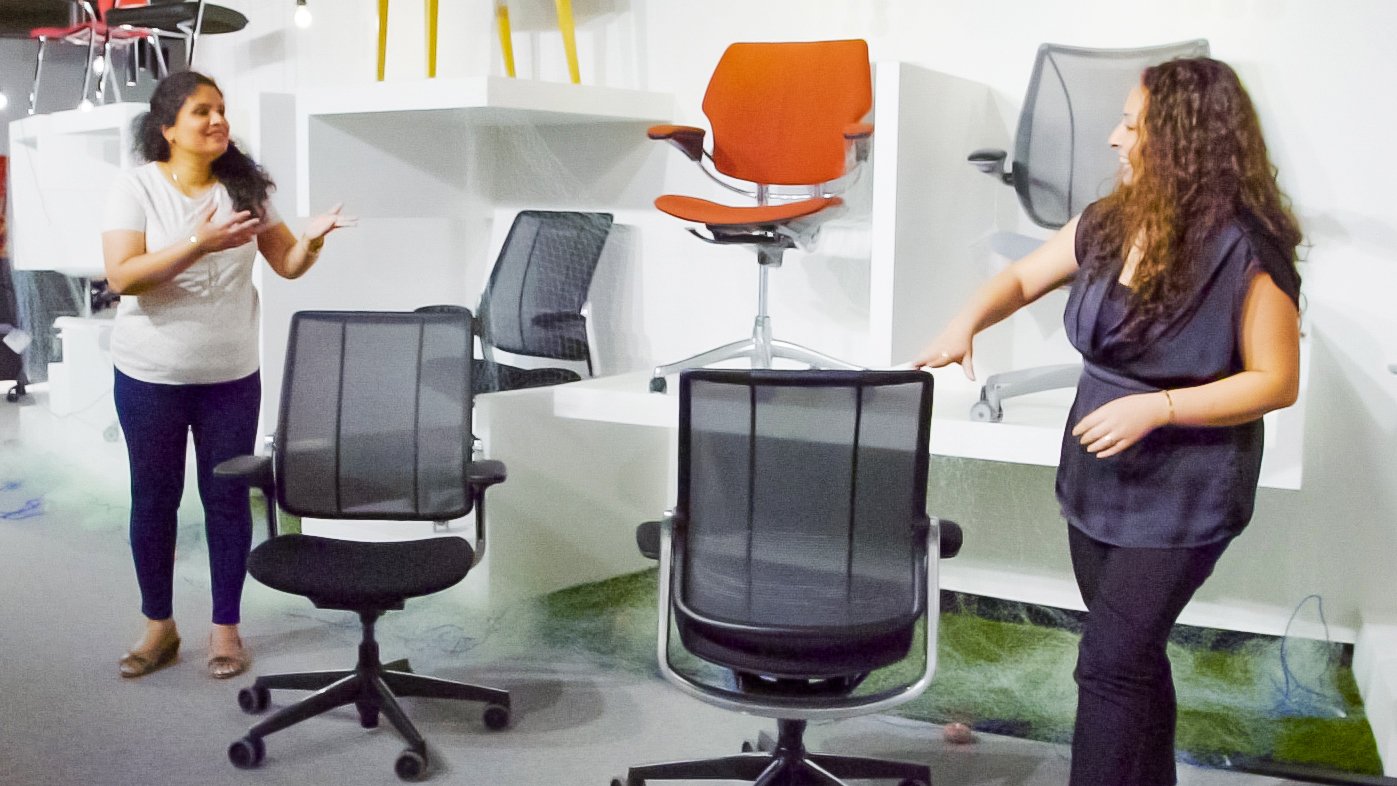
Ben: There aren’t any gimmicks or unnecessary components to this chair. That’s what I love about it. It’s got such a great sustainability angle to it that is something you cannot know just sitting on it. This is why you really need an engaged client to listen to your story, which might make the price hard to justify.
This chair doesn’t really belong to any particular industry, like corporate or healthcare. For the Smart Ocean, it is the type of client that’s important, as the chair is a strong competitor to similar sustainability focused products, and it comes from a brand like Humanscale. For those looking to get LEED or WELL certified, I highly recommend the Smart Ocean chair.
Lydia: I personally feel that chairs like these work best in healthcare projects. I know for a fact that people working in administrative roles in the healthcare industry work longer than the standard 8 hour shifts. So it would really help to have a chair like this in there.
The price point is well placed among similar products, but it’s still on the higher end. In a price sensitive market like the Middle East, that might make it difficult. But with the increase in projects aiming for higher sustainability standards, this chair pretty much sells itself.

